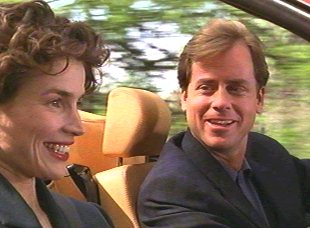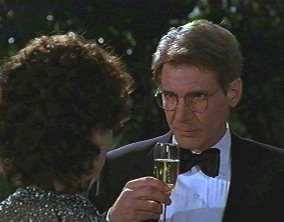Sabrina (1995)
 
It is one of the strengths of this film that it knows when to update the old screenplay in favor of something more modern, although most of the best dialogue from the old film is gone. In the places of the old characters, plot elements, and actors are their modern counterparts, and for the most part, it works. But sometimes you just can't improve upon or even repeat successes from the past. Sabrina is the story of the Larrabee family, their chauffeur, and the chauffeur's daughter, Sabrina (Julia Ormond). Sabrina is in love with David (Greg Kinnear), the youngest and most irresponsible Larrabee. Despite her father's admonitions that "the full-time observation of David Larrabee is not a recognized occupation," she spends her evenings in a tree overlooking the Larrabee parties while David works his magic on wealthy young women. As in the original 1954 Sabrina, the title character is sent to Paris, where her father hopes she will get over David. Unlike the older movie, Sabrina promptly jumps in the sack with the nearest Frenchman. Sure, she supposedly learns a useful skill while in Paris (this time photography instead of cooking), but the important thing we're supposed to learn is that, through some sexual adventures, she now has confidence and hopefully, some perspective on her non-relationship with David. We wonder if these scenes were strictly necessary; it seemed a bit more meaningful that Hepburn's Sabrina learned something of life with a lecherous-but-harmless old baron she met in cooking class. Hepburn-Sabrina "found herself" in the opera house and in walks along Paris streets on rainy days. Ormond-Sabrina "finds herself" on fashion photo shoots and between the sheets. Hmmm. Maybe we'd prefer hanging out with Ormond's Sabrina after all. While Sabrina is gone, David becomes engaged to a wealthy young woman. Linus (Harrison Ford), knowing a good thing when he sees it, uses the engagement to start an alliance between his company and the company of the bride-to-be's father. Together, the two companies will produce indestructible flat-screen televisions, thereby allowing Ford to re-enact Bogart's whip-out-a-revolver-in-the-middle-of-his-office scene. When Sabrina returns, however, David falls for her, putting his engagement and Linus' merger in jeopardy. Linus, despite his reputation as "the world's only living heart donor," decides to try and woo Sabrina away from David to salvage his business deal.
Ormond, however, could never compare favorably to Audrey Hepburn in our eyes. Despite her prettiness and obviously competent acting in other roles, Ormond suffers from a double-image effect. Whenever we see her stand in a certain spot or deliver a certain line, we will always see Hepburn doing it instead. How can an actress, any actress, hope to overcome that? Although Sabrina is competently acted and directed, it breaks down tragically towards the end with a trite wrap-up that fails to ring true. In the original 1954 Sabrina, Linus merely shows up on board Sabrina's Paris-bound ship, and without a single line of dialogue, she realizes why he's there and accepts him. It's a perfectly romantic ending. In this modern incarnation, however, Linus boards a Concorde jet and arrives in Paris ahead of Sabrina, meeting her at her flat. (Why not the airport?) A five-minute conversation ensues as the actors try to convince us that something romantic is happening. Unfortunately, it doesn't work. "I've been following in footsteps all my life," says Linus in those last few minutes of the film. It's too bad he strayed from the path at the end.
 Review date: 7/15/98 
This review is © copyright 1998 Chris Holland & Scott Hamilton. Blah blah blah. Please don't claim that it's yours blah blah, but feel free to e-mail it to friends, or better yet, send them the URL. To reproduce this review in another form, please contact us at guys@stomptokyo.com. Blah blah blah blah. |

